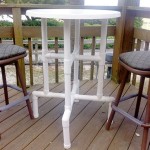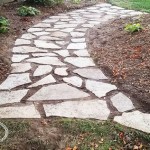Small Cement Patio Designs: Maximizing Limited Outdoor Spaces
Cement patios represent a durable and versatile option for creating outdoor living spaces. When dealing with limited square footage, careful planning and design are crucial to maximize functionality and aesthetic appeal. Small cement patio designs necessitate a strategic approach that considers space optimization, material selection, and overall ambiance.
The following article examines key considerations and design ideas for small cement patios, providing insights into transforming confined areas into inviting and practical extensions of the home. Effective small patio design hinges on understanding spatial constraints and leveraging design principles to create the illusion of more space while catering to specific lifestyle needs.
Optimizing Space Through Layout and Design
The layout of a small cement patio significantly impacts its usability and perceived size. Prioritizing functionality is essential. Begin by identifying the primary purpose of the patio: dining, lounging, entertaining, or a combination thereof. This will dictate the furniture needed and influence the spatial arrangement.
Consider the flow of traffic to and from the house. A clear, unobstructed path minimizes clutter and enhances the sense of openness. Avoiding sharp corners and opting for curved lines can create a more fluid and inviting atmosphere. Integrating the patio seamlessly with the existing landscape or garden can visually expand the space. This might involve extending planting beds, creating a gradual transition in levels, or incorporating vertical elements such as climbing plants.
Employing modular furniture allows for flexible arrangements. Pieces can be easily reconfigured or moved when needed, adapting the patio to different activities. Built-in seating, such as benches integrated into the patio's perimeter, maximizes seating capacity without taking up valuable floor space. These built-in elements also contribute to a clean and minimalist aesthetic, further enhancing the perception of spaciousness.
Vertical space is often underutilized in small patio designs. Implementing vertical gardens, hanging planters, or strategically placed trellises can add visual interest and greenery without encroaching upon the limited floor area. Mirrors can also be used to create the illusion of depth and reflect light, making the patio feel brighter and more expansive. The placement of mirrors should be carefully considered to avoid undesirable reflections, focusing instead on reflecting greenery or open sky.
Color choices also contribute to the overall perception of space. Lighter shades of cement and patio furniture tend to make the area feel larger and more airy. Introducing pops of color through accessories, cushions, or potted plants can add vibrancy and personality without overwhelming the space. A monochromatic color scheme, using variations of a single color, can create a sense of visual harmony and cohesiveness, which contributes to a more spacious feel.
Selecting the Right Cement and Finishes
The type of cement and the chosen finish play a crucial role in the aesthetic appeal and durability of a small patio. Various cement options are available, each offering distinct characteristics in terms of strength, texture, and cost. Standard concrete is a common choice, providing a cost-effective and reliable base. However, decorative concrete options can significantly enhance the patio's appearance.
Stamped concrete mimics the look of natural stone, brick, or tile, offering a wide range of design possibilities. This option allows for customized patterns and textures, adding visual interest and sophistication. Staining concrete is another effective way to enhance its appearance. Concrete stains penetrate the surface, creating a permanent color that resists fading and chipping. Acid stains produce mottled, variegated effects, while water-based stains offer a wider spectrum of colors and more uniform coverage.
Exposed aggregate concrete provides a textured surface by revealing the pebbles or stones embedded within the concrete mix. This finish offers excellent slip resistance and adds a natural, rustic feel to the patio. Polished concrete creates a smooth, glossy surface that is both aesthetically pleasing and easy to maintain. This option is particularly well-suited for modern or contemporary designs.
The choice of finish should complement the overall design style of the home and the intended use of the patio. A smooth, level surface is essential for dining and entertaining areas, while a textured finish may be more suitable for areas where slip resistance is a concern. Proper sealing is crucial for all cement patios to protect against moisture, stains, and weathering. Regular maintenance, including cleaning and resealing, will help to prolong the life and appearance of the patio.
Consider the environmental impact of cement choices. Opting for recycled concrete aggregate or using permeable concrete can contribute to sustainable building practices. Permeable concrete allows water to drain through the surface, reducing runoff and minimizing the impact on local drainage systems. This is particularly beneficial in areas with heavy rainfall or where water conservation is a priority.
Integrating Landscaping and Outdoor Elements
Landscaping and outdoor elements are essential for transforming a small cement patio into a cohesive and inviting outdoor living space. Strategic planting can soften the hard edges of the concrete, adding texture, color, and visual interest. Choosing plants that are appropriate for the local climate and soil conditions is crucial for ensuring their long-term health and vitality.
Container gardening is an excellent option for small patios, allowing for flexibility and easy maintenance. A variety of pots and planters can be used to create a diverse and visually appealing arrangement. Consider the size and shape of the pots in relation to the overall scale of the patio. Grouping pots of varying heights and textures can add depth and interest. Select plants with different foliage colors and flowering times to provide year-round visual appeal.
Incorporating water features, such as small fountains or birdbaths, can add a calming and tranquil element to the patio. The sound of running water can mask unwanted noise and create a more relaxing atmosphere. Water features also attract birds and other wildlife, enhancing the connection with nature. The size and style of the water feature should be proportionate to the size of the patio.
Outdoor lighting plays a crucial role in extending the usability of the patio into the evening hours. String lights, lanterns, or strategically placed spotlights can create a warm and inviting ambiance. Consider the energy efficiency of the lighting fixtures. LED lights are a long-lasting and energy-saving option. Path lighting can enhance safety and highlight architectural features or landscaping elements. Motion-sensor lights can provide added security.
Adding a small fire pit or outdoor fireplace can create a focal point and provide warmth during cooler evenings. Consider the safety regulations and space requirements before installing a fire feature. Portable fire pits offer flexibility and can be moved when not in use. Ensure that the fire feature is placed away from flammable materials and that there is adequate ventilation.
Creating a sense of privacy is often a key consideration in small patio designs. This can be achieved through the use of fences, screens, or strategically planted hedges or trees. Choose materials and designs that complement the overall aesthetic of the patio. A trellis covered in climbing plants can provide both privacy and visual interest. Bamboo screens offer a natural and sustainable option. The height and density of the privacy screen should be carefully considered to balance privacy with natural light.

30 Nice Ideas How To Makeover Concrete Patio For Small Backyards Simphome Designs Backyard

Concrete Patio Design Ideas And Cost Landscaping Network

Ideas For Small Backyard Patio Arka Bahçe Peyzaj Düzenlemesi Verandası çitleri

315 Sq Ft Small Concrete Paver Patio Design With Seat Wall Mypatiodesign Com

Concrete Patio Design Ideas And Cost Landscaping Network

Concrete Patio Ideas Design Your Backyard Network

20 Design Ideas For Your Concrete Patio

50 Stunning Concrete Patio Ideas To Elevate Your Backyard

Tiered Steps Small Patio Design Stones Pavers

36 Remarkable Concrete Patio Ideas On A Budget








